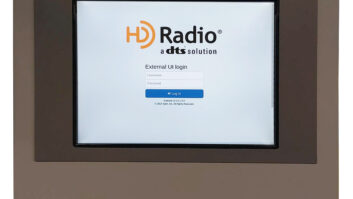HD Radio Could Die on the Vine – Unless You and I Do Something About It Now
You and I are not Kevin Costner, and HD Radio is not the Field of Dreams. Because we build it does not necessarily mean the audience will come.
(click thumbnail)Mark Ramsey
The HD Radio path we are galloping down is a treacherous one. And the future of our industry hangs in the balance.
HD Radio has been much examined by the engineers and sellers and owners and programmers. But from what I can tell, not a single consumer marketer has ever tried to make sense of it.
Until now.
Will HD Radio die a premature and ignominious death? I hope not. But the difference between the success of, say, digital photography and the failure of, say, AM stereo is the difference between understanding the way consumers think and ignoring it.
So far, we’re ignoring it.
Here are the reasons HD Radio could die on the vine – unless you and I do something about it now.
Problem 1: How Do You Sell a Radio?
HD Radio requires that consumers buy new hardware. New radios. Not since the dawn of our industry have we needed to drive sales of hardware.
But we are content providers. And we own the pipes. We handle a distribution channel that’s already in every car, workplace and home – it’s universal. We don’t know – and haven’t needed to know – how to sell radios. And if you think selling these radios is as simple as “getting behind the effort,” talking it up and handing out free samples, please stop taking the brown acid now.
People will buy these radios for two reasons: Either the radios will piggyback on something they buy for other reasons, i.e., “I buy a new car and HD Radio comes standard,” or they will want the content that is available exclusively on HD Radio and nowhere else.
Problem 2: HD Radio Is Selfish
HD Radio presumably solves an industry problem, namely how to keep up with technology, expand our offerings to advertisers and compete more effectively with satellite radio. But what audience problem does it solve uniquely?
Here is a slate of competing answers, all of them flawed:
More choice? The vast majority of listeners already have enough choice – all our research and ratings experience tells us that. We assume that listeners subscribe to satellite radio because of the enormous choice. I think this assumption is wrong.
The statistics indicate that satellite listeners tune in only slightly more channels than radio listeners tune in stations. Having access to 100 channels is not an attraction if I don’t use them.
But choice isn’t just about using more channels or stations, it’s about having more unique ones to choose from, you might argue. True enough. But would it surprise you if you discovered that the most popular satellite radio channels are clones of the most popular radio stations? The hits are the hits. …
More versions of your core format? This is the same as “more choice.” Besides, dozens of format skews are already available on satellite radio or via streaming broadband – soon to your cell phone, the ultimate “portable radio.” By the time HD Radio is widely available, these alternatives to radio will likely be flourishing.
“It’s Digital!”- i.e., better audio quality? To the industry, and any consumer who does their homework, HD Radio is positioned as “Pure Digital. Clear Radio.” The pitch, in other words, is that this is technologically better radio.
Where’s the evidence that audio quality is a meaningful benefit, that “bad audio” is one of radio’s audience problems? Most people don’t have a problem with the audio quality of their radios. The vast majority of your audience does not consist of audiophiles. In fact, your listeners are less likely to be discriminating musicologists and more likely to be tone deaf.
As marketing guru Seth Godin wrote me on this topic of audio quality as a benefit for HD Radio: “Yikes, (this) is such a hard sell. I just spent thousands of dollars lowering the quality of my stereo at home by switching my CDs to MP3s and buying a Sonos player. The iPod vastly outsells turntables because people don’t want quality, they want control.”
Where’s the “control” with HD Radio? In the hands of broadcasters, that’s where, not listeners.
No commercials? Commercials: Now there’s a listener problem. But HD Radio won’t help us there.
Data channels for services such as traffic, news, and weather? Those services are already on the market and will be commonplace by the time HD Radio is widely available.
But radio is “free”! Indeed it is. But time and again consumers prove they’re willing to pay for what they value. After all, water is free, yet people buy the expensive bottled stuff every day – more than $8.3 billion in 2003 alone. Just try telling folks HD Radio is free in the same breath you tell them a new radio costs $200. …
Problem 3: What’s the Simple, Clear Benefit?
People buy what benefits them – in fact, in a real sense people buy the benefit, not the product. They buy products that satisfy wants better than other products do and they buy stuff that satisfies those wants uniquely. If I as a consumer don’t have a problem with radio, I don’t need HD Radio.
This, in fact, is why there aren’t already millions more subscribers to Sirius or XM: Most people don’t have a radio problem. And no problem requires no solution. …
Problem 4: Who’s the Target Audience?
Who are the best first customers for HD Radio? They are the tech-heads, the innovators, the gadget freaks, the trendsetters.
They are, in other words, the very same folks who took the dive with satellite radio and are now under contract with Sirius or XM. They are the same folks who pay Launch.com or MSN to stream their “radio” online. Either way, they will be disinclined to cancel just so they can buy yet another radio – unless our content is utterly unique.
Problem 5: Fighting Satellite Radio on Its Terms Is a Losing Proposition
There’s a logic that says because satellite is nipping at radio’s heels we must take action to be more like satellite radio. This logic ignores the fact that becoming “more like” satellite means becoming redundant to satellite radio. …
Problem 6: The Product Is Different in Every Market
Satellite radio is a coherent brand, the same nationwide. HD Radio will be different in every market, depending on the programming decisions made in that market.
That means that satellite radio is selling one product but HD Radio is selling as many products as we have markets.
How do you sell a technology that is different everywhere you sell it? Answer: You can’t. You can only sell the content on it.
That adds a sizable quantity of confusion to the mix; and the more confusing the product, the less consumers will pay attention to it. And the less attention they pay to it, the less apt they are to adopt it.
Problem 7: The Technology “Cart” Is Before the Content “Horse”
We should know what we’re going to multicast on this technology before we set out to market it. Consumers aren’t buying radios, after all, they’re buying what we put on them. When was the last time you bought a ticket to a show without knowing who was playing?
Why are we as an industry inviting our audience to a “blind date” with our future? It is the content in the technology – what we put on the radios – not the presumed “gee-whiz” factor, that can make HD Radio a hit.
Make no mistake: That content must be special and magnetic and unique. Splintered versions of our existing formats will not be sufficient. HD Radio will demand star talent and will, I predict, be driven by non-music content – talk and entertainment – if it is to be driven at all.
Problem 8: Radio Doesn’t Live in a Vacuum
HD Radio is already competitively outfoxed, before it even gets out of the gate. The phenomenon of podcasting will allow listeners to get both music and non-music content while bypassing radio of any kind.
I know it’s a licensing nightmare right now and the technology required to podcast is not yet mainstream, but both of these issues will be resolved within a matter of months, well ahead of HD Radio’s rollout.
Meanwhile, my sister doesn’t listen to radio. Her office, her co-workers and the hundreds of listening quarter-hours they represent every week belong to streaming audio, which will only grow as high-speed connections become ever more ubiquitous.
And that only scratches the surface. High-speed Internet connections to cell phones are on the horizon – and (unlike radios) cell phones are commonly upgraded every two years.
Within the next 24 months WiFi will be widely available and free to all in cities like Austin, Portland, Philadelphia, New York City, San Francisco and others. And that’s not all. Reuters reports, “Slightly more than 100 US cities … are setting up wireless networks now … (and) close to 1,000 local governments worldwide have plans in the works.”
Free wireless audio access? There’s another name for that: “Radio.”
A Call to Action
If HD Radio fails, it will be for one reason: We ignored good marketing sense and allowed it to fail. But if it succeeds we’re still not out of the woods.
Radio’s long-term relevance is not linked inextricably to the fate of HD Radio. Our industry must understand that we have a seat at the table of wireless audio – the biggest seat with the broadest distribution.
We can use our influence and muscle and talent and resources to develop and own that big seat until the end of time.
RW welcomes other points of view.












